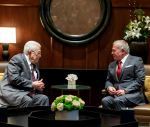You are here
Sanctions on the installment plan
May 10,2014 - Last updated at May 10,2014
Western leaders remain undecided about their next steps in trying to stop Russia’s aggression towards Ukraine. But one thing has become abundantly clear: their timid efforts so far — personal sanctions, an embargo on weapons exports, and the temporary suspension of Russia’s G-8 membership — have proved to be far from adequate to convince Russian President Vladimir Putin to back down.
Fortunately, there is a simple solution: A European Union embargo on imports of Russian raw materials, especially oil and gas. Just how manageable would an import embargo be?
There are, of course, good reasons why the EU has not taken this step already. Europe depends on Russian energy supplies, and European banks and businesses are highly exposed to Russia. But, with a carefully calibrated strategy, damage to Europe’s economy could be avoided.
More to the point, Europe does not really have a choice.
As Putin’s desire to establish himself in Russian history as an imperial aggrandiser — alongside Ivan the Terrible, Catherine the Great, and Lenin — becomes increasingly apparent, so does the need for decisive action from the EU.
Indeed, unless Putin is stopped, his appetite is likely to become even more voracious, turning towards the Baltic states, Moldova, or Central Asia — with increasingly serious consequences for European security.
Unlike the weak strategy that the EU has been pursuing so far, an embargo on Russian oil and gas would put real pressure on Russia. Energy accounts for 70 per cent of Russia’s export earnings and half of its budget revenue — money that is used to finance the military, nationalist state-owned media, cyber wars, the fifth column in Ukraine and other countries, and the lavish lifestyles of the country’s elites, including Putin.
Given Europe’s dependence on Russian energy supplies, imports could not be cut off all at once. Instead, the embargo should be introduced incrementally.
The first step would be to subject all purchases of Russian fuel to import quotas, a well-tested tool in the EU, where it is often used for imports of agricultural products from third countries. In the embargo’s first year, companies importing Russian energy would be required to obtain licences for the amount that they have imported to date.
Each subsequent year, the import quota would be reduced by 5 per cent, so that the EU’s total annual imports of Russian energy would be reduced by half within a decade. This approach would enable European economies to adjust gradually to the new conditions, while giving them time to search for new energy sources, improve conservation, and reduce consumption.
The prospect of such a drastic reduction in its export revenues would be sobering for the Kremlin, especially given the difficulty of finding alternative markets. The Chinese, for example, are already driving a hard bargain; the knowledge that Russia has no other option would give them even more leverage in negotiations.
The EU, for its part, can survive the impact of an embargo. Russia accounts for some 30 per cent of the EU’s total imports of raw materials and roughly 20 per cent of its gas and oil.
But it accounts for only 12 per cent of the EU’s overall energy consumption, meaning that, over the next 10 years, the EU would have to supplement only about 6 per cent of the energy it consumes. That is a small price to pay to dampen Russia’s imperial ambitions and thus enhance European security.
The problem is that the cost would not be shared equally across Europe, owing to EU member states’ different levels of dependence on Russian energy. Indeed, some countries — such as the Baltic states, Poland, and Slovakia — have long-term commitments with Russia, and thus would need more time to meet the requirements of the embargo.
Fortunately, this problem, too, can be resolved. Once the EU issues the import quotas, companies should be allowed to trade them, allowing them to optimise the adaptation process.
Moreover, the EU should work to improve the flow of energy supplies across its internal borders, helping member states closer to Russia to compensate for the losses incurred by higher fuel prices.
Meanwhile, European countries should intensify efforts to diversify their energy supplies, which should include higher imports from allies like the United States and a significant increase in renewable energy’s share of consumption.
Decreasing imports of Russian energy would prove far more damaging for Russia than it would for the EU.
Indeed, it is the easiest and probably the most effective way to force Russia to comply with international norms — and no one would have to fire a single shot.
The writer, a member of the Polish Sejm, is a former minister for foreign economic relations, deputy minister for the economy, and mayor of Warsaw. ©Project Syndicate, 2014. www.project-syndicate.org











